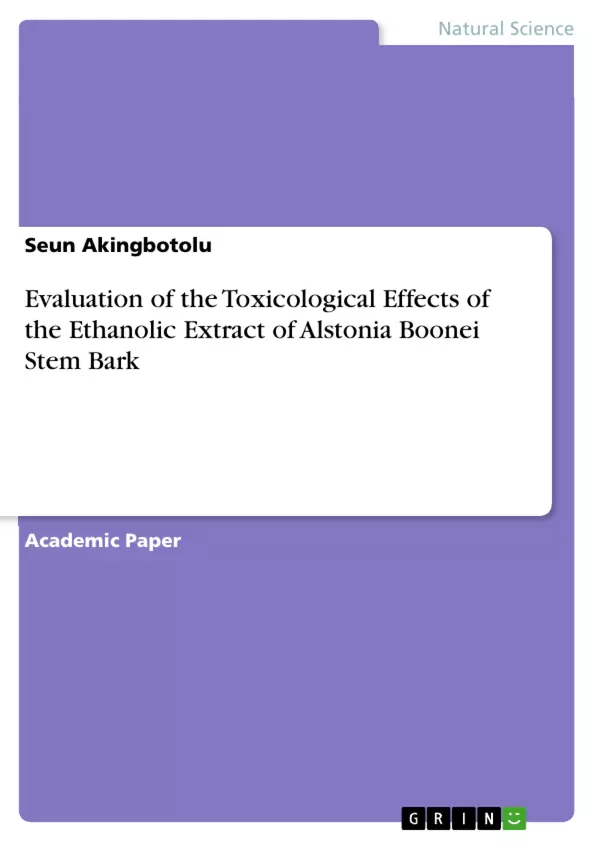This study investigated the toxicological effects of ethanolic extract from alstonia boonei stem bark, based on the dosage and duration of administration to albino mice. We evaluated for the phytochemistry of the stem bark and the clinical biochemical parameters of blood plasma of albino mice. After administering the aqueous extract to the albino mice, the biochemical parameters in their blood plasma were determined using commercially available kits. The determination of the phytochemical constituent of the ethanolic extract revealed the presence of alkaloids, flavonoids, saponins, terpenoids and cardiac glycosides. After the first week of administration, no significant variation in most of the biomarkers was recorded. However, after second week of treatment, urea and alanine aminotransferase levels fell significantly. Consequently, the ratio of aspartate transaminase to alanine transaminase was found to be much greater than 2, which was attributed to alcoholic toxicity from the ethanolic extract consumption.
Table of Contents
- Introduction
- Methods
- Collection and preparation of plant extract and phytochemical screening
- Animal preparation, grouping and extract administration for toxicological study
- Biochemical evaluation of blood samples
- Results
- Discussion
- Conclusion
Objectives and Key Themes
This study investigated the toxicological effects of an ethanolic extract from alstonia boonei stem bark, focusing on the impact of dosage and duration of administration on albino mice. The research aimed to determine the phytochemical composition of the stem bark and to analyze the clinical biochemical parameters of blood plasma in the mice following extract administration.- Evaluation of the toxicological effects of ethanolic extract from alstonia boonei stem bark on albino mice.
- Determination of the phytochemical composition of the stem bark.
- Analysis of the clinical biochemical parameters of blood plasma in albino mice after extract administration.
- Assessment of the impact of dosage and duration of administration on toxicological effects.
- Comparison of findings with previous research on alstonia boonei and its extracts.
Chapter Summaries
The "Introduction" chapter provides context for the study by discussing the prevalence and impact of malaria, highlighting the increasing interest in using plant extracts as an alternative treatment, and underscoring the need to understand the potential side effects of prolonged use. The chapter focuses on alstonia boonei as a prominent medicinal plant, reviewing prior research on its efficacy in various diseases, but also emphasizing the lack of detailed toxicological studies for prolonged use or high dosage administration. The "Methods" chapter outlines the specific procedures employed in the research, including the collection and preparation of the plant extract, phytochemical screening, animal preparation, grouping, and extract administration, and the biochemical evaluation of blood samples. The "Results" chapter presents the data obtained from the study, highlighting the observed changes in various biochemical parameters in the blood plasma of albino mice after different durations and dosages of the alstonia boonei extract. The "Discussion" chapter analyzes the results in relation to previous findings and literature, discussing the potential mechanisms underlying the observed effects, including alcoholic toxicity from the ethanolic extract consumption. The chapter also explores the implications of these findings for understanding the potential benefits and risks of using alstonia boonei extracts for medicinal purposes.Keywords
This study primarily focuses on the toxicological effects of the ethanolic extract from alstonia boonei stem bark, specifically investigating its impact on albino mice. Key areas of focus include phytochemistry, clinical biochemical parameters, dosage, duration of administration, alcoholic toxicity, and the potential benefits and risks of using alstonia boonei extracts for medicinal purposes.- Quote paper
- Seun Akingbotolu (Author), 2020, Evaluation of the Toxicological Effects of the Ethanolic Extract of Alstonia Boonei Stem Bark, Munich, GRIN Verlag, https://www.hausarbeiten.de/document/963284


